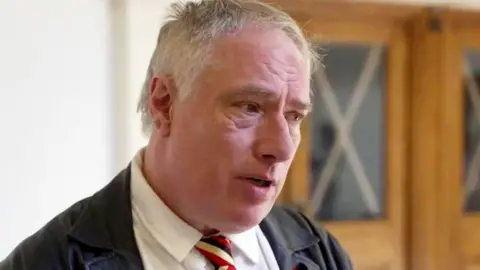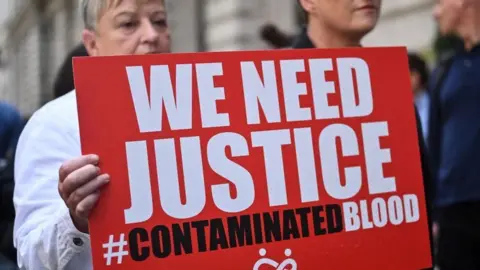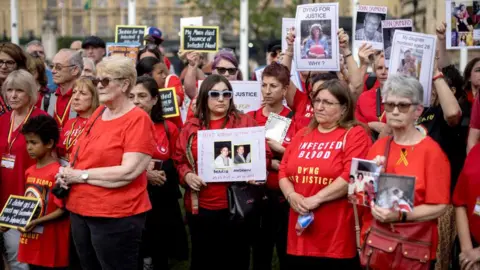Infected blood: I was told I couldn't have children
 BBC
BBCA victim of the infected blood scandal said he was told not to have children because of the risk of transmission.
Richard Warwick is among the 30,000 people infected with HIV and hepatitis C from contaminated blood products and transfusions between 1970 and 1991.
The government has confirmed it will push ahead with compensation payments for people like Richard.
"My wife and I were told in no uncertain terms you can't have a child because of the risk of HIV - there was no medication. I was given two years to live,” he told BBC News.
"If the child was born, would it live or die? Would it lose its father? That has been the biggest impact on our lives as a couple."
 Getty Images
Getty Images"Derogatory and insulting"
Campaigners have broadly welcomed the move but say it comes too late for many.
About 3,000 of the victims have since died. Mr Warwick told BBC News: "I wish this had been done two decades earlier, when people were still alive."
He was infected with HIV and hepatitis B at school as a child due to treatment he was given there.
The size of the payouts will depend on individual circumstances but could top £2m for some.
The compensation due is being judged under five criteria – harm caused, social impact from stigma and isolation, impact on autonomy and private life, care costs and financial loss.
Mr Warwick should also get a £15,000 payment promised to pupils subjected to high-risk medical research at his Hampshire school.
Mr Warwick was infected with HIV and hepatitis B after receiving blood products at Treloar's school as part of medical treatment for haemophilia, which he was diagnosed with at three years old.
He described the sum as "derogatory and insulting".
"I don't know where they have got [the amount] from - they seem to have plucked it out of the air," he told BBC Radio 4's Today programme.
"It is insulting... not only to the children who managed to live through what was done to them at school but also to the parents of children who died and their wider families.
"How they have come up with this figure is beyond comprehension."
Regulations will be passed before 24 August to allow the first payments to be made by the end of the year.
The previous government had announced the scheme in May following publication of the public inquiry report into the scandal.
Campaigners had feared the payouts might be delayed because of the election being called shortly after that announcement.
But ministers said they wanted to press ahead as quickly as possible.
The first payments will be made to those who were infected. Family members and loved ones of those infected will also be entitled to compensation but that scheme will not be available until next year.
 Getty Images
Getty ImagesThe government announcement comes after Sir Robert Francis, the interim chair of the new Infected Blood Compensation Authority, reviewed the recommendations put forward for the scheme by the public inquiry.
He suggested a number of changes which have been accepted by ministers.
These include additional payments for those subjected to “unethical research”.
Sir Robert also suggested the existing support scheme that is currently in place should continue. Originally it had been proposed this would end.
Cabinet Office minister Nick Thomas-Symonds said: “This is an important milestone for victims and campaigners who have waited too long for justice.
"We’re going to do everything possible to deliver compensation quickly."
Mr Thomas-Symonds explained that the £15,000 was "an additional part" to the compensation figure and had been recommended to the government by the interim chair of the infected blood inquiry.
Jason Evans, of the campaign group Factor 8, whose father died in the infected blood scandal, has said the announcement of support scheme payments for life for victims is a "welcome step".
But he told the Today programme documentation provided by the government had caused some confusion.
"Some of it's very detailed, and there's not one document which places all of the information in a single place where people can look at it and say 'this is how much I might get'," he said.
"There is some confusion but I think once you get past all of that - which I think will take some time - it has to be a welcome step, that the fighting for trying to get to this point is coming to an end and the challenge turns to actually delivering it."
